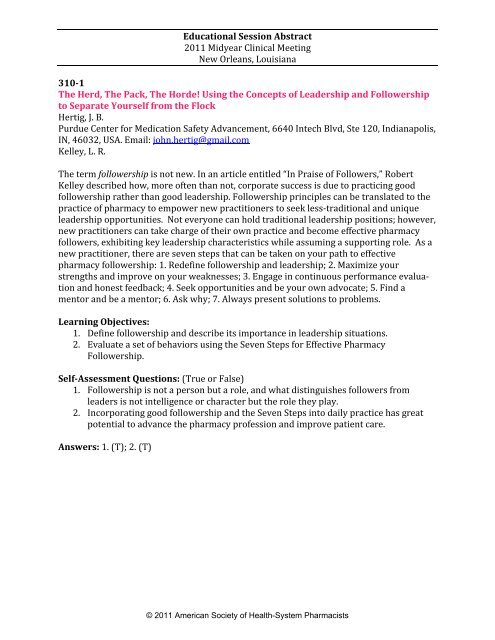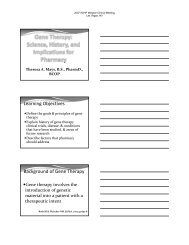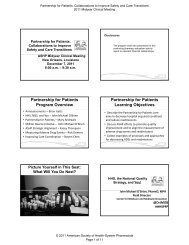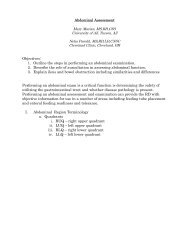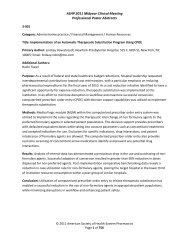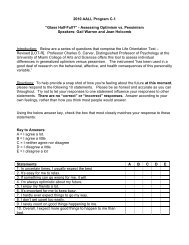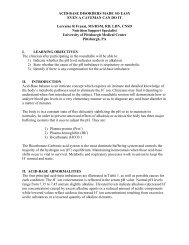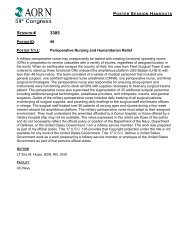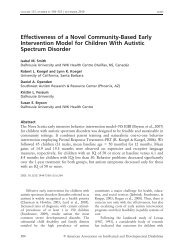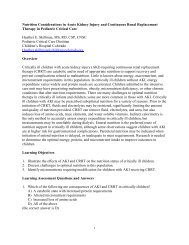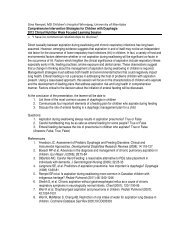Educational Session Abstract 2011 Midyear Clinical Meeting New ...
Educational Session Abstract 2011 Midyear Clinical Meeting New ...
Educational Session Abstract 2011 Midyear Clinical Meeting New ...
Create successful ePaper yourself
Turn your PDF publications into a flip-book with our unique Google optimized e-Paper software.
<strong>Educational</strong> <strong>Session</strong> <strong>Abstract</strong><br />
<strong>2011</strong> <strong>Midyear</strong> <strong>Clinical</strong> <strong>Meeting</strong><br />
<strong>New</strong> Orleans, Louisiana<br />
310-1<br />
The Herd, The Pack, The Horde! Using the Concepts of Leadership and Followership<br />
to Separate Yourself from the Flock<br />
Hertig, J. B.<br />
Purdue Center for Medication Safety Advancement, 6640 Intech Blvd, Ste 120, Indianapolis,<br />
IN, 46032, USA. Email: john.hertig@gmail.com<br />
Kelley, L. R.<br />
The term followership is not new. In an article entitled “In Praise of Followers,” Robert<br />
Kelley described how, more often than not, corporate success is due to practicing good<br />
followership rather than good leadership. Followership principles can be translated to the<br />
practice of pharmacy to empower new practitioners to seek less-traditional and unique<br />
leadership opportunities. Not everyone can hold traditional leadership positions; however,<br />
new practitioners can take charge of their own practice and become effective pharmacy<br />
followers, exhibiting key leadership characteristics while assuming a supporting role. As a<br />
new practitioner, there are seven steps that can be taken on your path to effective<br />
pharmacy followership: 1. Redefine followership and leadership; 2. Maximize your<br />
strengths and improve on your weaknesses; 3. Engage in continuous performance evaluation<br />
and honest feedback; 4. Seek opportunities and be your own advocate; 5. Find a<br />
mentor and be a mentor; 6. Ask why; 7. Always present solutions to problems.<br />
Learning Objectives:<br />
1. Define followership and describe its importance in leadership situations.<br />
2. Evaluate a set of behaviors using the Seven Steps for Effective Pharmacy<br />
Followership.<br />
Self‐Assessment Questions: (True or False)<br />
1. Followership is not a person but a role, and what distinguishes followers from<br />
leaders is not intelligence or character but the role they play.<br />
2. Incorporating good followership and the Seven Steps into daily practice has great<br />
potential to advance the pharmacy profession and improve patient care.<br />
Answers: 1. (T); 2. (T)<br />
© <strong>2011</strong> American Society of Health-System Pharmacists
<strong>Educational</strong> <strong>Session</strong> <strong>Abstract</strong><br />
<strong>2011</strong> <strong>Midyear</strong> <strong>Clinical</strong> <strong>Meeting</strong><br />
<strong>New</strong> Orleans, Louisiana<br />
310-2<br />
The Herd, The Pack, The Horde! Using the Concepts of Leadership and Followership<br />
to Separate Yourself from the Flock<br />
Kelley, L. R.<br />
University of Michigan Hospital and Health Systems; 1500 E. Medical Center Dr, SPC 5008,<br />
Ann Arbor, MI 48109-5800, USA. Email: lrkelley@umich.edu<br />
The need for leaders in our profession continues to grow. A key statistic: when asked<br />
whether pharmacy students had any interest in pharmacy leadership, 62% indicated they<br />
would like to pursue this option. Yet, when the same question was posed to current<br />
practitioners, only 30% indicated interest in pharmacy leadership. Multiple reports have<br />
been published regarding the leadership gap, and although the gap may be narrowing,<br />
many new practitioners are still hesitant to pursue leadership positions. As such, there<br />
appears to be barriers for practitioners, especially newer practitioners, to pursuing<br />
and/or obtaining leadership positions. Following this educational session, participants<br />
will be able to translate key followership principles to the practice of pharmacy.<br />
Particpants will be given tools to seek out less traditional and unique leadership<br />
opportunities, helping fill critical leadership gaps.<br />
Learning Objectives:<br />
1. Describe ideal conditions for motivating followers.<br />
2. Evaluate the role of followership within your organization.<br />
Self‐Assessment Questions: (True or False)<br />
1. Exemplary followers are best led through a “selling” leadership approach.<br />
2. Value congruence (alignment) is crucial to successful followership.<br />
3. Exemplary followers are Independent, innovative, and willing to question<br />
leadership.<br />
Answers: 1. (F); 2. (T); 3. (T)<br />
© <strong>2011</strong> American Society of Health-System Pharmacists


